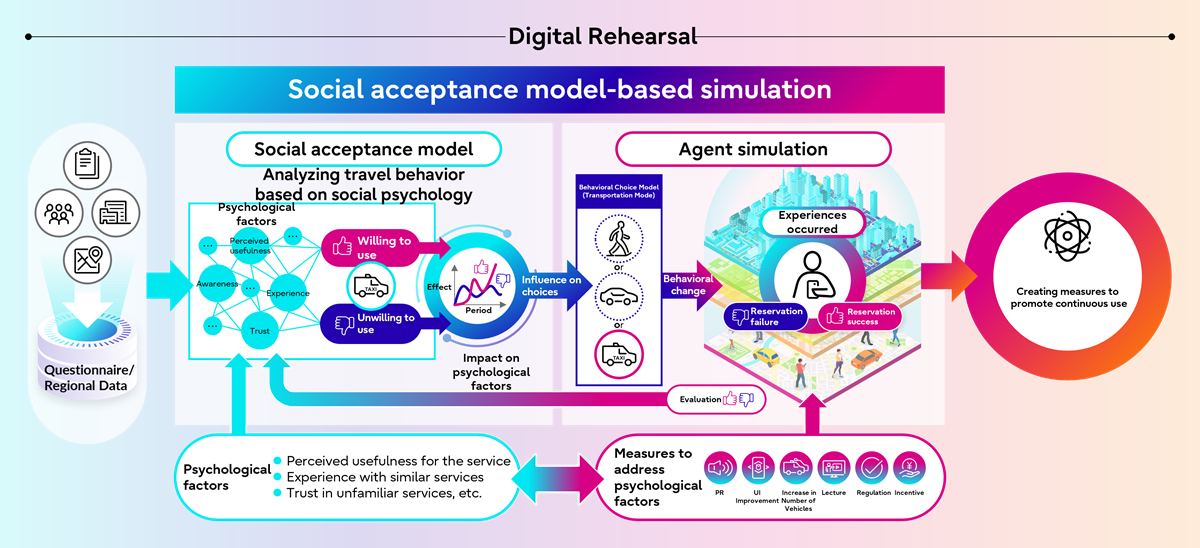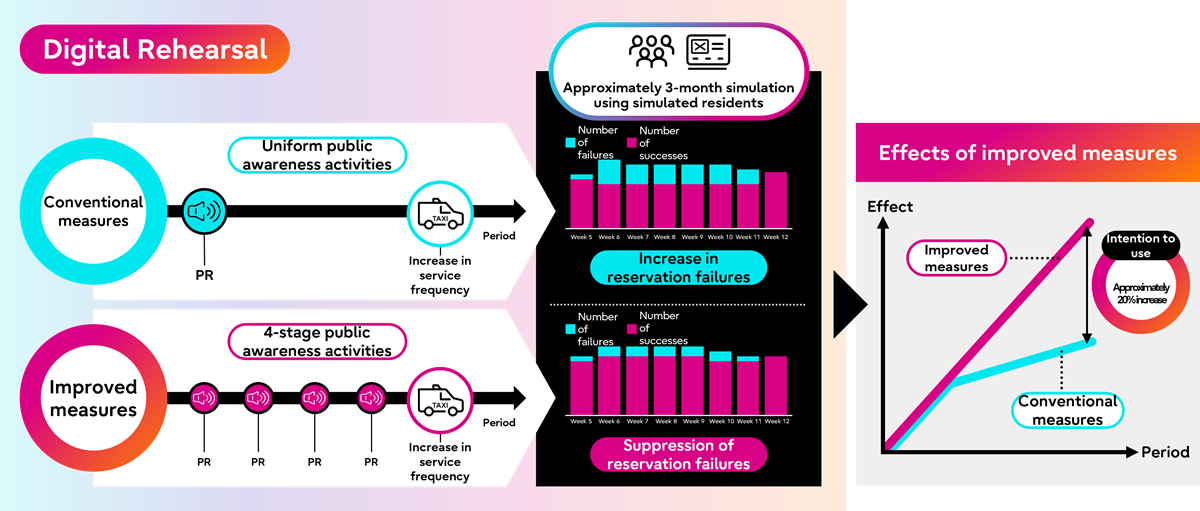PRESS RELEASE
Fujitsu and Nagoya University develop simulation tech to combat transportation gaps
Verification shows 20% improvement in usage intent for ride-sharing taxi services
Fujitsu Limited
Tokai National Higher Education and Research System - Nagoya University
Kawasaki and Nagoya, Japan, July 24, 2025
Fujitsu Limited and Nagoya University, a member of the Tokai National Higher Education and Research System (THERS), have jointly developed a technology to encourage the use of new transportation services and eliminate transportation gaps. The “social acceptance model-based simulation (SAMSIM)” simulates how psychological factors influence residents' willingness to use new transportation options and combined with AI-powered digital rehearsal technology, it allows for proactive evaluation of strategies to ensure successful service adoption.
Ride-sharing and self-driving cars have emerged as ways to address transportation gaps as populations age and driver shortages persist. However, the ease with which these new services are accepted varies depending on various psychological factors such as perceived safety, trust, and usefulness. To promote usage of these services, it is necessary to accurately understand the psychological factors that impact people's willingness to try them create measures that encourage behavioral change.
Simulations using this technology showed that strategically timed and targeted public awareness campaigns could increase usage intent by approximately 20%. This research is a key outcome of the Fujitsu-Nagoya University Social Digital Twin Research Division at the Fujitsu Small Research Lab [1]. A demonstration of the technology will be accessible through the Fujitsu Research Portal starting August 1, 2025.
Overview and background of the technology
The "Social Acceptance Model," developed by Nagoya University, provides a framework for understanding the psychological drivers behind transportation choices. By integrating this model with Fujitsu's agent simulation digital rehearsal technology, which accurately reproduces and predicts human behavior on digital twins, the system can assess how various interventions – such as targeted advertising or other service improvements – will affect residents' perceptions and consequently their willingness to use the service.
To verify the effectiveness of this technology, Fujitsu utilized the data from a field experiment of an on-demand ride-sharing taxi service conducted by Kawanishi Town in Nara Prefecture and CHUO FUKKEN CONSULTANTS CO.,LTD. in fiscal year 2023. In addition, Nagoya University conducted a 48-point survey to clarify the psychological factors that influence the intention to use on-demand ride-sharing taxis and obtained responses from approximately 1,200 people (15% of the local population).
Based on this survey data, the simulation was built to replicate residents' choices regarding the service. The model succeeded in reproducing the actual usage trends of on-demand transportation in Kawanishi Town, achieving accuracy of 90%.
Using this simulation, the two parties optimized two key measures – "public awareness activities" and "service expansion by increasing the number of vehicles" – for the two psychological factors that were estimated to have a strong impact on usage intention: "awareness of the service" and " perceived usefulness." The simulation specifically revealed that strategically improving the timing and frequency of the distribution of promotional materials and the increase of the number of available taxis could significantly reduce reservation failures and boost usage intention by approximately 20%, leading to a greater service sustainability.


Isao Kita, Director of the Comprehensive Policy Division, Kawanishi Town, Nara Prefecture, comments:
“I believe that pre-emptive consideration of transportation policies based on digital rehearsal technology will make it easier for local governments to consider measures amidst increasingly complex social issues. The possibilities are fascinating.”
Future plans
By fiscal 2026, Fujitsu and Nagoya University will continue to conduct demonstration experiments and aim to develop this technology into a solution that suggests measures to improve adoption of new transportation services using data gained from small-scale resident surveys. Going forward, both parties will apply this technology to the design of public services in a wide range of fields, including healthcare, medicine, urban development, and environmental measures, in addition to the mobility sector, thereby improving people's well-being through converging technologies that combine the digital realm and humanities and social sciences.
Note
-
[1] Fujitsu Small Research Lab:
Established in 2023. Fujitsu researchers reside or stay long-term at universities to accelerate joint research, discover new themes, develop human resources, and build medium- to long-term relationships with universities.
Related Links
Press Contacts
Fujitsu Limited
Public and Investor Relations Division
Tokai National Higher Education and Research System – Nagoya University
Phone: 052-789-5773
All company or product names mentioned herein are trademarks or registered trademarks of their respective owners. Information provided in this press release is accurate at time of publication and is subject to change without advance notice.
Date: 24 July, 2025
City: Kawasaki and Nagoya, Japan
Company: Fujitsu Limited, Tokai National Higher Education and Research System - Nagoya University
